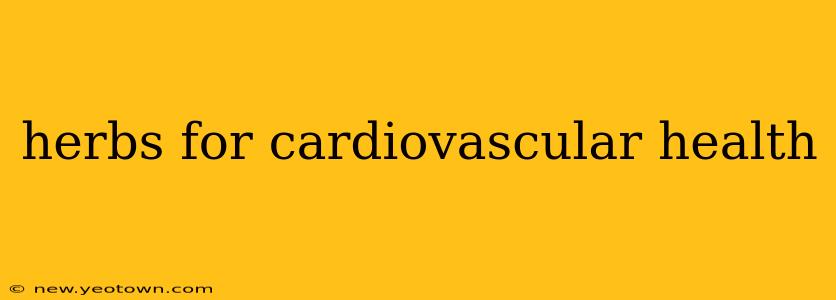For centuries, herbal remedies have played a significant role in supporting overall well-being, and cardiovascular health is no exception. While modern medicine offers powerful interventions, many are exploring the potential benefits of natural approaches to complement their existing healthcare plans. Let's embark on a journey to discover some of the herbs that have shown promise in supporting cardiovascular health. Remember, it's crucial to consult your doctor before incorporating any new herbs into your routine, especially if you're already taking medication.
What are the best herbs for heart health?
This is a question with many nuanced answers, as the "best" herb will depend on individual needs and health conditions. However, several herbs stand out for their potential cardiovascular benefits, supported by some research, although more large-scale studies are often needed for definitive conclusions. Let's delve into some of them.
Hawthorn Berry (Crataegus monogyna): The Gentle Giant of the Heart
My grandmother always swore by hawthorn berry. She'd tell stories of how her own mother used it to maintain her strength well into her eighties. And you know what? There's some scientific backing to support her claims. Hawthorn berry has been used for centuries to support heart health, and studies suggest it may improve blood flow and reduce blood pressure. It's thought to work by relaxing blood vessels and improving the heart's efficiency. Its gentle nature makes it a popular choice for many.
Garlic (Allium sativum): A Culinary and Cardiovascular Champion
Garlic, a staple in cuisines around the world, isn't just flavorful; it also boasts impressive potential health benefits. It contains compounds like allicin, which have been linked to improved blood lipid profiles and reduced blood pressure. The pungent aroma you get after eating garlic isn't just a side effect; it's a testament to its powerful compounds. It’s believed to work by preventing platelet aggregation (the clumping of blood platelets, which can contribute to blood clots).
Ginkgo Biloba: Supporting Circulation and Blood Vessel Health
Often associated with cognitive function, Ginkgo Biloba also has a history of use in traditional medicine for cardiovascular support. While research is ongoing, some studies suggest that it may help improve blood circulation and reduce the risk of blood clot formation by inhibiting platelet activation. It's important to note that Ginkgo Biloba can interact with certain medications, so consulting your doctor before use is crucial.
Hibiscus (Hibiscus sabdariffa): A Tropical Treat for the Heart
The vibrant red hibiscus flowers, popular in teas and beverages, have been showing up in cardiovascular research. Some studies suggest that hibiscus may help lower blood pressure, though more large-scale, high-quality trials are needed to confirm these findings. Its tart, refreshing taste makes it a pleasant way to potentially support your heart health.
Can herbs cure cardiovascular disease?
No. Herbs should not be considered a cure for cardiovascular disease. They may offer supportive benefits, but they should never replace conventional medical treatments prescribed by a doctor. If you have a diagnosed cardiovascular condition, it's vital to follow your doctor's treatment plan meticulously. Herbs can be a complementary addition, but not a replacement.
Are there any side effects of using herbs for cardiovascular health?
While generally safe when used appropriately, herbs can have side effects. Some herbs can interact with medications, causing potential complications. Allergic reactions are also possible. Always consult your doctor or a qualified healthcare professional before using herbal remedies, especially if you have underlying health conditions or are taking other medications.
How do I choose the right herbs for my heart health?
The best approach is to consult a qualified healthcare professional, such as a doctor or a registered herbalist. They can assess your individual health needs and recommend appropriate herbs, taking into account any pre-existing conditions or medications you might be taking. Self-treating can be dangerous, so professional guidance is always recommended.
This exploration of herbs for cardiovascular health is just a starting point. Always prioritize a healthy lifestyle, including regular exercise, a balanced diet, and stress management, as the foundation for a healthy heart. Remember, herbs can be supportive allies, but they are not magic bullets. Consult your doctor before making any changes to your healthcare regimen.

